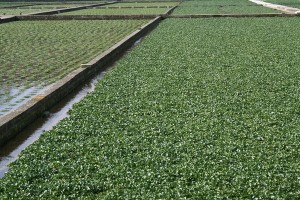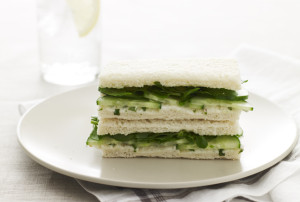Public Health England has provided an update on two separate E. coli O157 outbreaks linked to watercress – that stuff on cucumber sandwiches and in salads — in 2013.
In September 2013, a national increase in cases of verotoxigenic E. coli O157 phage type 2 VT2 was observed in England. Between 30 August and 19 September, 19 cases (14 in England, four in Wales and one in Scotland) were reported sharing the same distinct Multi Locus Variable Number Tandem Repeat Analysis (MLVA) pattern (and single locus variants), not  previously seen in the UK. Onset dates ranged from 17 to 29 August and the cases had an unusual demography for VTEC cases: they were predominantly female with a median age of 64 years. Seven cases were hospitalized, although no deaths or cases of hemolytic uremic syndrome (HUS) were reported. Interviews with patients and the use of detailed food questionnaires revealed the link to the consumption of pre-packaged watercress purchased from a particular supermarket chain. This led to the prompt voluntary withdrawal and recall of watercress products by the retailer.
previously seen in the UK. Onset dates ranged from 17 to 29 August and the cases had an unusual demography for VTEC cases: they were predominantly female with a median age of 64 years. Seven cases were hospitalized, although no deaths or cases of hemolytic uremic syndrome (HUS) were reported. Interviews with patients and the use of detailed food questionnaires revealed the link to the consumption of pre-packaged watercress purchased from a particular supermarket chain. This led to the prompt voluntary withdrawal and recall of watercress products by the retailer.
Despite trace-back investigations, microbiological testing of watercress and environmental sampling at farms, the source of contamination of the watercress remains unclear. Two additional cases with an identical MLVA profile were retrospectively identified with onset dates in February 2013. One had consumed watercress and one pre-packaged salad, both from retailers representing a different supply chain, suggesting that the contamination is unlikely to have occurred at the farms. Following restocking of watercress at the supermarket chain, one additional case was reported with an onset date of 21 October 2013. The case reported consuming bagged mixed salad containing watercress from that supermarket. No further cases of the outbreak profile have been reported.
During outbreak investigations, a second, smaller outbreak of six cases of VTEC O157 PT 2 VT2 with a different MLVA profile was identified: two cases reported consuming watercress from the implicated retailer prior to  the recall, one consumed watercress prior to the recall but with no detail on where it was purchased, and one consumed mixed salad from the retailer during the period that watercress was withdrawn from sale. Two further cases with onsets of 1 October 2013 were members of a family who had consumed watercress as part of a meal at a pub. Local trace-back confirmed that the pub purchased unwashed watercress from the same supplier as was involved in the first outbreak.
the recall, one consumed watercress prior to the recall but with no detail on where it was purchased, and one consumed mixed salad from the retailer during the period that watercress was withdrawn from sale. Two further cases with onsets of 1 October 2013 were members of a family who had consumed watercress as part of a meal at a pub. Local trace-back confirmed that the pub purchased unwashed watercress from the same supplier as was involved in the first outbreak.
During sampling of the farms supplying watercress, VTEC O157 PT 2 VT2 identical on typing to isolates from the second outbreak was isolated from one of the watercress beds. Environmental investigations revealed that this watercress bed was in close proximity to an adjacent field containing cattle – the primary reservoir for VTEC. It seems likely that the cause of this second cluster of cases was transfer of VTEC from the field to the watercress bed either from wildlife entering the watercress farm or run-off water.

